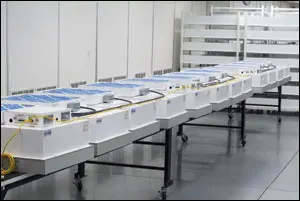Why Fan Filters Are Essential for Your Cleanroom Environment
Maintaining a cleanroom environment is critical in many industries, from pharmaceuticals to electronics. One key component in ensuring that your cleanroom remains contaminant-free is the fan filter. In this blog, we'll explore why fan filters are so crucial, how they function, and the benefits they bring to your cleanroom environment.
Understanding the Role of Fan Filters in Cleanrooms
Fan filters play an essential role in maintaining the cleanliness of a cleanroom by removing airborne particles. These filters are designed to capture contaminants, preventing them from entering the environment and compromising the integrity of the work being performed.
Cleanrooms are delicate ecosystems where even the smallest particle can cause significant disruptions. From sensitive pharmaceutical formulations to intricate electronic components, any level of contamination can lead to product defects and operational setbacks. This is where fan filters come into play. By continuously filtering the air, they ensure that the environment remains within strict cleanliness parameters. Thus, fan filters are indispensable tools in preserving the controlled atmosphere of cleanrooms.
Furthermore, fan filters contribute to overall operational efficiency. When contaminants are kept at bay, there is less need for frequent deep cleaning, thereby reducing downtime. This continuous filtration process not only safeguards the products and processes within the cleanroom but also protects the health and safety of personnel who work in these highly controlled environments.
How Fan Filters Work
Fan filters are equipped with specialized materials that trap impurities as air passes through. The fan then circulates the filtered air throughout the cleanroom space, maintaining a consistent level of cleanliness. This process is vital in preventing contamination and ensuring that the cleanroom meets stringent industry standards.
The core functionality of a fan filter system lies in its ability to circulate and purify air continuously. As air enters the filter, it passes through multiple layers designed to capture a range of particle sizes—from large dust particles to microscopic microorganisms. HEPA (High-Efficiency Particulate Air) and ULPA (Ultra-Low Penetration Air) filters are commonly used due to their high filtration efficiency. These filters can capture particles as small as 0.3 microns, ensuring an exceptionally clean environment.
Additionally, the fan component of the system is crucial as it ensures even distribution of the cleaned air. Without this, certain areas of the cleanroom might become hotspots for contaminants. The fan keeps the air moving, maintaining a uniform distribution of filtered air and thus supporting the overall cleanliness and operational efficiency.
Benefits of Using Fan Filters in Your Cleanroom
The benefits of using fan filters in a cleanroom are numerous. They help maintain air quality by removing harmful particles, reduce the risk of contamination, and ensure conformity with regulatory requirements. Additionally, fan filters can extend the lifespan of other cleanroom components by preventing the accumulation of dust and debris.
By maintaining optimal air quality, fan filters significantly reduce the likelihood of product contamination. This is especially critical in industries like biotechnology, where even minute contaminants can alter the outcome of an experiment or batch. For electronics manufacturing, maintaining a dust-free environment is essential to prevent short circuits and ensure the longevity of components.
Moreover, regulatory compliance is often a significant concern for cleanroom environments. Health and safety standards, such as those from ISO (International Organization for Standardization) and GMP (Good Manufacturing Practices), require stringent air quality controls. Fan filters help meet these standards, providing reassurance to both regulators and clients that the environment is properly controlled and safe.
Last but not least, by preventing the accumulation of contaminants, fan filters help protect other critical cleanroom components, such as HVAC systems and machinery. This not only reduces maintenance costs but also prolongs the lifespan of these expensive pieces of equipment, contributing to overall cost-efficiency in the long run.
Choosing the Right Fan Filters
Selecting the appropriate fan filters for your cleanroom is crucial for optimal performance. Factors to consider include the type of contaminants present, the size of the cleanroom, and the specific industry standards that must be met. Consulting with a professional can help you make an informed decision that best suits your needs.
It's essential to match the filter to the specific requirements of your cleanroom. For instance, if your cleanroom deals with highly sensitive biological materials, you might need filters with higher efficiency ratings like ULPA. On the other hand, cleanrooms for electronic manufacturing might have different air quality standards, making HEPA filters a more suitable option.
The size of the cleanroom also plays a significant role in selecting the correct fan filters. Larger cleanrooms require more robust systems to ensure even air distribution and consistent filtration across the entire space. In contrast, smaller cleanrooms might get away with simpler, less powerful fan filter units.
Industry standards are another crucial factor. Different industries have varied benchmarks for cleanroom air quality. For example, pharmaceutical cleanrooms need to adhere to strict GMP guidelines, while electronic manufacturing cleanrooms might follow ISO standards. Understanding these standards helps in selecting filters that comply with all relevant regulations, ensuring both safety and efficiency.
Maintenance and Replacement of Fan Filters
Regular maintenance and timely replacement of fan filters are key to ensuring their efficiency and longevity. Monitoring the pressure drop across the filter, performing periodic inspections, and adhering to the manufacturer's guidelines will help keep your cleanroom environment pristine and uncontaminated.
Monitoring the pressure drop is a critical aspect of fan filter maintenance. A significant increase in pressure drop indicates that the filter is clogged and requires replacement. Ignoring this can lead to reduced airflow, deteriorating cleanroom air quality, and eventually compromising the entire system's performance.
Periodic inspections allow for early detection of any issues related to the fan filters. This can involve checking for physical damage to the filter material or ensuring that the fan operates smoothly. Early identification of problems can prevent more significant issues down the line, saving both time and money.
Adhering to the manufacturer's guidelines ensures that the filters are maintained correctly. Each filter type has its specific maintenance requirements, and following the manufacturer's recommendations helps in achieving optimal performance and extending the filter's lifespan. Regular training of maintenance staff on these guidelines can go a long way in keeping the cleanroom environment compliant and efficient.
Wrapping Up: The Importance of Fan Filters in Cleanrooms
Fan filters are an indispensable part of maintaining a sterile and efficient cleanroom environment. They help eliminate contaminants, ensure compliance with industry standards, and ultimately protect both products and personnel. Investing in high-quality fan filters is not just a smart move—it's essential for the safety and success of your operations.
For your next cleanroom filtration project contact CleanAir Solutions, Inc. at (707) 864-9499, or by email to Sales@CleanroomSpecialists.com. You can browse the website for more information at www.CleanRoomSpecialists.com

